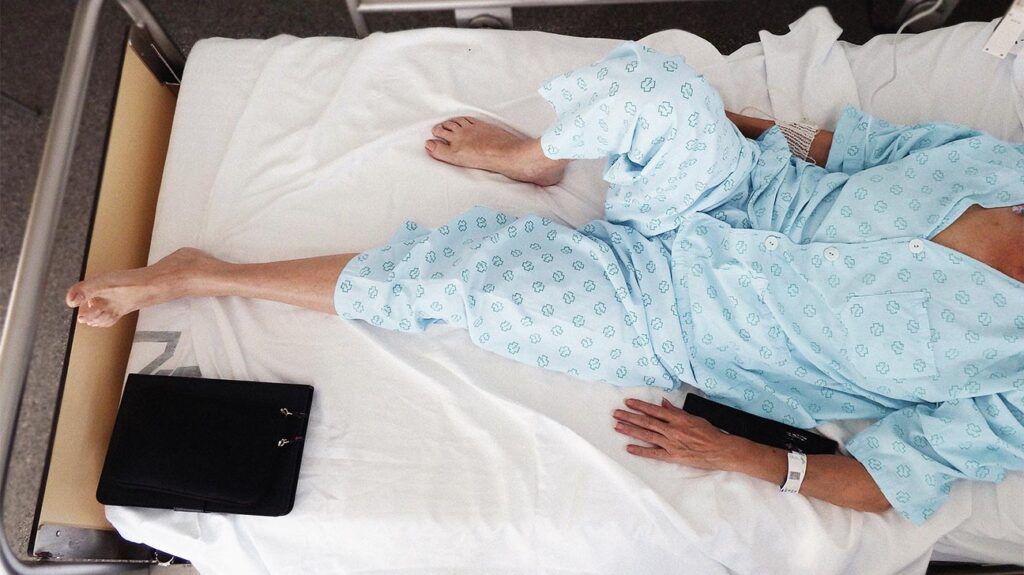Diarrhea after surgery is a potential side effect of several surgical procedures. If postsurgical diarrhea lasts longer than 2 days, it is a good idea for a person to check with their doctor to ensure their recovery is on track.
Diarrhea refers to loose and watery stools. A person may have more bowel movements or the usual amount.
Additional symptoms can accompany diarrhea, depending on the underlying cause. Examples include fever, cramping, and fatigue. A person may also experience urgency when they need to pass stool.
Diarrhea has numerous causes, including infection and irritable bowel disease (IBD). It can also occur following surgery.
This article discusses the causes of diarrhea after surgery, when to be concerned, how long it should last, and frequently asked questions.

There are several reasons a person might experience diarrhea after surgery.
- Dumping syndrome: This refers to
rapid gastric emptying that can lead to symptoms including diarrhea. Dumping syndrome can occur after certain types of surgery, such as stomach surgery. - Increased bile production: A postsurgical increase in bile production can cause diarrhea. An estimated
63.5% of people who have diarrhea after cholecystectomy surgery (gallbladder removal) have bile acid diarrhea. - Bowel stenosis: A partial intestinal tract blockage may lead to diarrhea after surgery.
- Medications: Antibiotics people take to prevent surgical infection may cause diarrhea as a side effect. Anyone who suspects they may have antibiotic-related diarrhea must inform their doctor immediately. It is important for them to continue taking the medication as prescribed unless directed otherwise by their doctor.
- Bacteria:
Clostridioides difficile (C. diff) is an example of a common bacteria that can cause diarrhea after surgery. - Intestinal inflammation: Some people, such as those living with Crohn’s disease, may experience postsurgical
inflammatory diarrhea . - Reduced fluid absorption: If a person loses some of their bowel during surgery, this removes some of the tissue responsible for absorbing water.
Diarrhea can occur after any surgery, but some types carry a higher risk.
They include:
- gastric bypass
- bariatric surgery
- gallbladder removal
- intestinal surgery
- stomach surgery
- esophageal surgery
Postsurgical diarrhea is common. Diarrhea often resolves
However, it is advisable for a person to contact their doctor if they experience:
- diarrhea that lasts several days or longer
- stool that is black, red, white, or clay-like
- pain or cramping
- fever
- vomiting
- weight loss
- diarrhea at night that interferes with sleep
Experts advise that people with diarrhea of any duration increase their fluid intake to prevent dehydration.
Learn moreLearn more about diarrhea and its treatment.
The duration of diarrhea after surgery depends on factors such as whether a person reacts to medications such as antibiotics. It can also depend on the type of surgery they have had.
If an antibiotic reaction is the cause of the diarrhea, it may continue for the duration of the medication use. This increases a person’s risk of dehydration, so it is important to replenish lost fluids.
It is a good idea for a person experiencing postsurgical diarrhea for longer than
The following are some frequently asked questions about diarrhea after surgery.
Is diarrhea 5 days after surgery typical?
Depending on the type of procedure a person has had, diarrhea may start a few days after surgery.
In a study involving 29 patients who received surgery for colorectal cancer, researchers found that the median onset of diarrhea was 4 days after surgery, but it could be longer.
It is advisable for a person to communicate with their surgeon or family doctor to determine what to expect in their situation.
Why do I have yellow diarrhea after surgery?
Yellow stool has several possible causes, including:
Sometimes, stool is yellow because of high fat content from an intestinal malabsorption difficulty.
What causes black stool after surgery?
The
Iron supplements and certain foods, such as black licorice, can also darken stool.
Since bleeding is a possible cause, it is a good idea for a person to contact their doctor if they pass black stool after surgery.
Diarrhea after surgery is a common occurrence. It often self-resolves quickly but can also show the presence of an underlying condition such as an infection.
Certain surgical procedures are more likely to cause postsurgical loose stool. Examples include surgeries involving the gastrointestinal tract.
It is important for a person to consult a surgeon to know what to expect in their situation.
